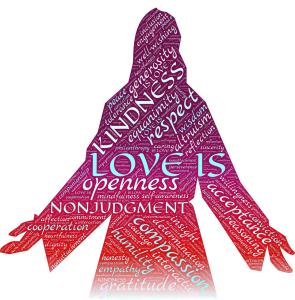Do you care about the feelings of others? Do you, like Bill Clinton in 1992, “feel others’ pain”? Is there any situation where concern for others’ feelings or empathy causes harm? How does compassion differ from empathy, specifically holy compassion?
In this article, I examine the differences between unfettered empathy and holy compassion. For this, I turn to Joe Rigney’s 2019 essay, The Enticing Sin of Empathy and the insights of Catholic moral theologian Fr. Thomas Berg, taken from a recent interview with National Catholic Register, for inspiration and clarification. I demonstrate that the modern inclination towards unfettered empathy, unlike holy compassion, harms both the focus of empathy and the empathic.
Unfettered Empathy to Sin
First, a word on unfettered empathy. In Rigney’s essay, written in the style of C.S. Lewis’ The Screwtape Letters, the demon Scratchpot states the following regarding unfettered empathy:
…empathy shifts the focus from the sufferer’s good to the sufferer’s feelings, making them the measure of whether a person is truly “loved.” We teach the humans that unless they subordinate their feelings entirely to the misery, pain, sorrow, and even sin and unbelief of the afflicted, they are not loving them.
Unfettered empathy places personal feeling at the center of all human interactions, regardless of the good of that person. In other words, the truly empathetic regard themselves as responsible for the feelings of others, not the good of others. To hurt another’s feeling, to “make” them feel bad, even for the other’s own good, demonstrates a lack or absence of “love.”
Furthermore, the unfettered empathetic must enter the feeling of others. For example, they must enter into the suffering of others or they themselves receive an indictment of unempathetic. To enter another’s suffering, even at the expense of good, reflects true love. Scratchpot goes on…
A human in pain is practically primed to say, “You don’t love me if . . .” and then to place entirely unreasonable demands on others.
“You don’t love me if…” becomes the mantra of the unfettered empathetic.
Holy Compassion to Salvation
Conversely, holy compassion focuses on the good of the other, not primarily their feelings. It does no evil in pursuit of the other’s good. Feeling plays a role in holy compassion but only insofar as they facilitate the overall good of the person. A doctor that prescribes chemotherapy to a cancer patient knows the pain it causes in the short term. A patient may forgo this treatment due to this pain but in doing so, they act contrary to their own good. The doctor must acknowledge the suffering of their patients. However, this suffering must not dominate over the patient’s overall good. A doctor cannot encourage a patient to die in order to save them from momentary pain. Such an action is evil. Back to the demon, Scratchpot:
However, just as the Enemy became like them in every way but sin, so also his followers are not permitted to sin in their attempts to comfort the afflicted. Thus, his compassion always reserves the right not to blaspheme. It seeks the sufferer’s good and subordinates itself to the Enemy’s abominable standard of Truth.
Therefore, holy compassion seeks the good of the other while not also doing evil. Like Christ, holy compassion enters the life of the one who suffers but does so to rescue them, not from “feeling bad,” but for their good. It also does so by doing no evil (sin), nor condoning evil (sin). To condone evil (sin) places the other in danger and therefore violates holy compassion.
Unfettered Empathy to Sin in the Church
Recently, some high-ranking prelates within the Catholic Church called for carve-outs for sexual sins in the name of “inclusion.” One such prelate, Cardinal Robert McElroy, stated the following regarding those who occupy carved-out spaces:
Many of these challenges arise from the reality that a church that is calling all women and men to find a home in the Catholic community contains structures and cultures of exclusion that alienate all too many from the church or make their journey in the Catholic faith tremendously burdensome.
Cardinal McElroy’s appeals to “structures and cultures of exclusion” and “tremendously burdensome” expectations represent examples of unfettered empathy. He goes on to clearly state his intent and his empathetic appeal, as it relates to the Eucharist:
The Eucharist is a central element of God’s grace-filled transformation of all the baptized. For this reason, the church must embrace a eucharistic theology that effectively invites all of the baptized to the table of the Lord, rather than a theology of eucharistic coherence that multiplies barriers to the grace and gift of the eucharist. Unworthiness cannot be the prism of accompaniment for disciples of the God of grace and mercy.
Moreover, such “accompaniment” (unfettered empathy) stands in stark contrast to St. Paul’s warning (or barrier of worthiness) in 1 Corinthians 11:27. To condone actions that place another’s soul at eternal risk, especially by a Cardinal, a shepherd of souls, is a scandal of the highest degree. A scandal that encourages Catholics to incur guilt “concerning the body and blood of the Lord.”
Holy Compassion to Salvation in the Church
In contrast to unfettered empathy, holy compassion seeks the good of the other. In relation to the Catholic Church, holy compassion seeks the ultimate spiritual good of the other. How this works in the lives of lay men and women in the Church does require pastoral care, but not by de-emphasizing Catholic moral teaching or pitting “love” against doctrine. Christ is the foundation of Catholic moral teaching. God loved the world and gave His only begotten Son (John 3:16). Catholic moral teaching represents a part of God’s gift of love. This love rescues us from our sin, it does not redefine sin to make us feel better. Father Thomas Berg, a moral theologian at St. Joseph Seminary, defines holy compassion, as it relates to sin, perfectly:
The Church must offer the world not only the promise of tenderly accompanying people in their often complex and confusing moral lives, but also a sincere presentation of the truth of the human person. Again, it’s not an either-or between pastoral approach and moral doctrine; it’s always both-and.
To summarize Fr. Berg, the Church must offer:
- The promise of tenderly accompaniment, and…
- Sincere presentation of the truth of the human person.
This “both and…” approach to sin recognizes the individual’s current situation but also provides them with guidance, rooted in truth, to overcome their sin. This approach, contrary to unfettered empathy, does not attempt to save someone’s feeling at the expense of their soul (Mark 8:36).
Doctor Analogy Redux
In conclusion, let’s circle back to the doctor analogy. No responsible doctor places the feelings of their patients over the patient’s overall health. Regardless of ailment, a doctor must do their best to heal the patient and do no harm. The same applies on a spiritual level and the effect sin has on a person’s soul. Likewise, no responsible priest, bishop, archbishop, or cardinal places the feelings of sinners over the sinner’s overall spiritual health. Regardless of sin, priests, bishops, archbishops, and cardinals must do their best to spiritually heal the sinner and do no harm. Those who place the feeling of sinners over their overall spiritual health risk that sinner’s soul and possibly their own.
May God help us towards holy compassion and not unfettered empathy, for that path leads to spiritual death.
If you enjoy my writing and want to support my work, please consider donating a monetary gift of any size or quantity by clicking here. Thank you!














